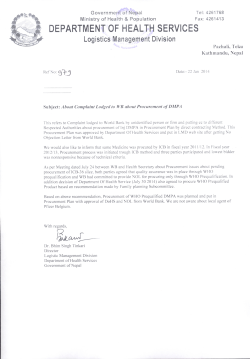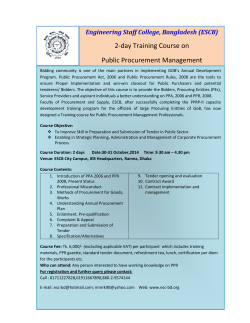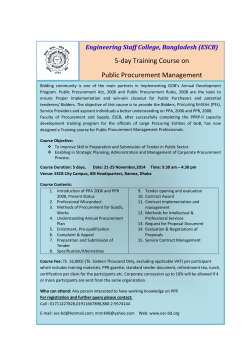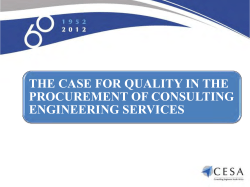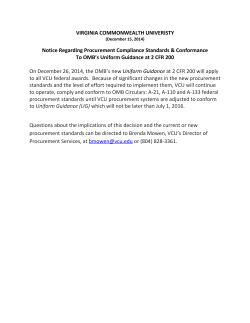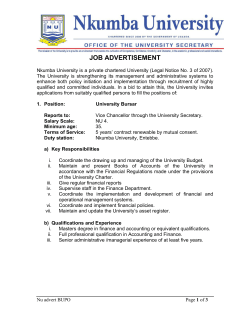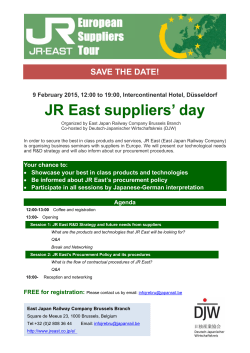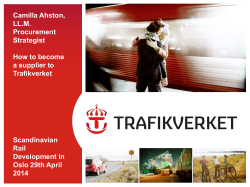
Presentation - WordPress.com
1 2 The World Bank Group: Our ‘Twin Goals’ Ending Extreme Poverty by 2030 Promoting Shared Prosperity IBRD IDA International Bank for Reconstruction and Development International Development Association Est. 1945 Role: Clients: Products: IFC International Finance Corporation Est. 1960 Est. 1956 MIGA Multilateral Investment and Guarantee Agency Est. 1988 To promote institutional, legal and regulatory reform To promote institutional, legal and regulatory reform To promote private sector development To reduce political investment risk Governments of member countries with per capita income between $1,045 and $12,746 and creditworthy Technical assistance Loans Policy Advice Governments of poorest countries with per capita income of less than $1,045 and/or not creditworthy Technical assistance Interest Free Loans Policy Advice Private companies in member countries Foreign investors in member countries Equity/Quasi-Equity Long-term Loans Risk Management Advisory Services Political Risk Insurance 4 1) Fiduciary responsibility Two board meetings per week; various committees/seminars 2) Representing 13 countries, as well as 13 shareholders (true cooperative): Armenia, Bosnia&Herzegovina, Bulgaria, Croatia, Cyprus, Georgia, Israel, Macedonia, Moldova, Montenegro, The Netherlands, Romania and Ukraine 3) Convening power/’business development’ 5 • 16,438 staff (of which 12,432 IBRD/IDA) • Open-ended contracts: 44% • HQ: 64%; Country Offices: 36% • 145 Country Offices • 18,241 short-term consultants (one or more days per year) • 174 Nationalities • Financing and technical expertise around the globe 6 7 8 Topsectors 1. Water 2. Horticulture 3. Agri & food 4. Life sciences & health 5. Energy 6. Logistics 7. High tech Chemicals Creative industries 8. 9. Global practices 1. Water (Junaid Ahmad) 2. Agriculture (Jurgen Vogele) 3. 4. 5. 6. 7. 8. 9. 10. Health, Nutrition, and Population (Tim Evans) Energy and Extractives (Anita George) Trade and Competitiveness (Marcelo Giugale) Transport and ICT (Pierre Guislain) Environment and Natural Resources (Paula Caballero) Education (Claudia Costin) Finance and Markets (Gloria Grandolini) Macroeconomics and Fiscal Management (Marcelo Giugale) 11. 12. 13. Poverty (Ana Revenga) Social Protection and Labor (Arup Banerji) Urban, Rural, and Social Development (Ede IjjaszVasquez) 14. Governance (Mario Marcel) 9 10 The World Bank Group Commitments - New Business (in billions of dollars) • WBG commitment volume to clients increased from US$58bn in FY13 to $66bn (+12%) 25 20 15 FY14 FY13 10 5 0 IBRD • • • • • IDA IFC MIGA TF IBRD commitment volume to clients totaled US$19bn (+21%) IDA commitment volume to clients totaled US$22bn (+27%) IFC commitment volume to clients totaled US$17bn (-.05%) MIGA commitment volume to clients totaled US$3bn (no change) TF commitment volume to clients totaled US$4bn (- 20%) Source: worldbank.org/en/about/annual-report 11 12 Source: worldbank.org/en/about/annual-report IBRD Country Commitment IDA Country Commitment Brazil 2,019 India 3,134 India 1,975 Pakistan 2,218 China 1,615 Bangladesh 1,888 Ukraine 1,382 Nigeria 1,698 Romania 1,374 Ethiopia 1,624 In millions of dollars 13 Source: worldbank.org/en/about/annual-report 14 Source: worldbank.org/en/about/annual-report 15 Complex: 5 entities, 6 regions, 14 global practices, 5 cross-cutting solutions areas, 25 Executive Directors, 188 Governors • Competitive: Global competition: American, Brazilian, Chinese, Dutch, English, French, German, etc. • Country-driven: Go Local! • 16 1. Funding: IFC (loans, equity) and insurance (MIGA) IFC: accelerator in local value chains; MIGA: credit enhancement for international banks 2. Corporate procurement: consultancy, equipment “Input/upstream” in DC: mainly consultancy contracts, HQ-sourcing and policy setting 3. World Bank financed projects “Output/downstream”: largest impact and volumes =) GO LOCAL Partnering with the World Bank Group requires long term strategic engagement! 17 Business Opportunities in Bank-Funded Projects: Project Cycle Country Country Partnership AssistanceFramework Strategy Evaluation Project Supervision Implementation Loan Approval and Signing World Bank/‘staff’ activity Project Identification Project Preparation Project Appraisal Loan Negotiations Country/’borrower’ activity Joint activity 18 The World Bank has NO contractual relationship with companies World Bank • Procurement Rules • Information Dissemination • Complaints • Country Partnership Framework (CPF) • Contractual Relation Government Project Management Unit Companies • Project Implementation • Contractual Relation Tips to ensure competitiveness • Monitor advertisements systematically- start early and have stamina • Identify local partners, sub-consultants or possible associations • Be informed about the country, project, processes and competition • Assess the market – compete where YOU are competitive • Solve the client’s problem - don’t impose your view. Consultants : Conduct a pre-proposal visit (if indicated in RFP) Fully address TOR Offer qualified consultants or key expert staff positions Assign a strong project manager Cite directly relevant technical and regional experience and prior experience with similar assignments Goods and Works : Understand local customs, laws and markets Respond adequately to technical specifications Unclear? Contact implementing agency to address any need for further clarifications, do NOT guess or assume Procurement Policy Review • • • Value for money is critical to development Informed by market-focused Procurement Strategy for Development Expanded options to apply non-price attributes With minimum criteria for quality Scoring method to evaluate non-price aspect of the bid Weighted against a scoring model for total cost • Bidding documentation to specify upfront logical, clearly articulated, comprehensive and relevant criteria Procurement Policy Review Timeline Presentation of draft policy to CODE/ Audit Committee FY15 Q1 Submission of final policy for Board approval FY15 Q2 Multi-stakeholder consultations FY15 Q3 Procurement Policy Review Proposed changes What will NOT Change • Reorganization of the current Procurement Guidelines into a modern procurement framework with clear roles and responsibilities • Updated procurement techniques that are market-centric • Stronger focus on fiduciary and project risk management that will allow for better targeting of Bank resources • More targeted initiatives to support country capacity building • Strategic engagement with key suppliers to improve overall performance • Centralized complaint monitoring and tracking • The Bank Procurement Framework will remain the default procurement mechanism for Bank operations • Adding to and restructuring the current mandatory regulations • The framework will remain fully committed to risk management, country procurement capacity building, and the application of good practices such as the standard bidding documents (SBDs) • Fraud and corruptions guidelines will remain in force consultations.worldbank.org/consultation/procurement-policy-review-consultations • Blog NL for WorldBank at www.nl4worldbank.org New and interesting projects (with main focus on Dutch partnercountries and/or Dutch ‘high potential’ sectors, i.e. the Topsectoren); • Tenders in eConsultant2 (corporate procurement and consultancies); • Background documents about the World Bank and the handbook Zakendoen met de Wereldbank Groep; • • Twitter account @NL4WB For latest updates and news about the World Bank, and about relevant work of Dutch organizations doing work for the World Bank. • Quarterly Newsletter NL for World Bank. • Contactpersons: Bouke Berns (bt.berns@minbuza.nl), Vincent Kooijman (vincent.kooijman@minbuza.nl) 23 Frank Heemskerk Executive Director fheemskerk@worldbank.org Mark van der Velden Senior advisor mvandervelden@worldbank.org Daan Marks Advisor daanmarks@worldbank.org The World Bank 1818 H Street N.W. Room MC13-433 Washington, D.C. 20433, USA Tel.: + 1-202-458-2052 Fax.: + 1-202-522-1572 website: www.worldbank.org/eds19 Disclaimer: This presentation does not represent the official World Bank Group’s positions and is confidential as it reflects Board discussions. 24
© Copyright 2024

